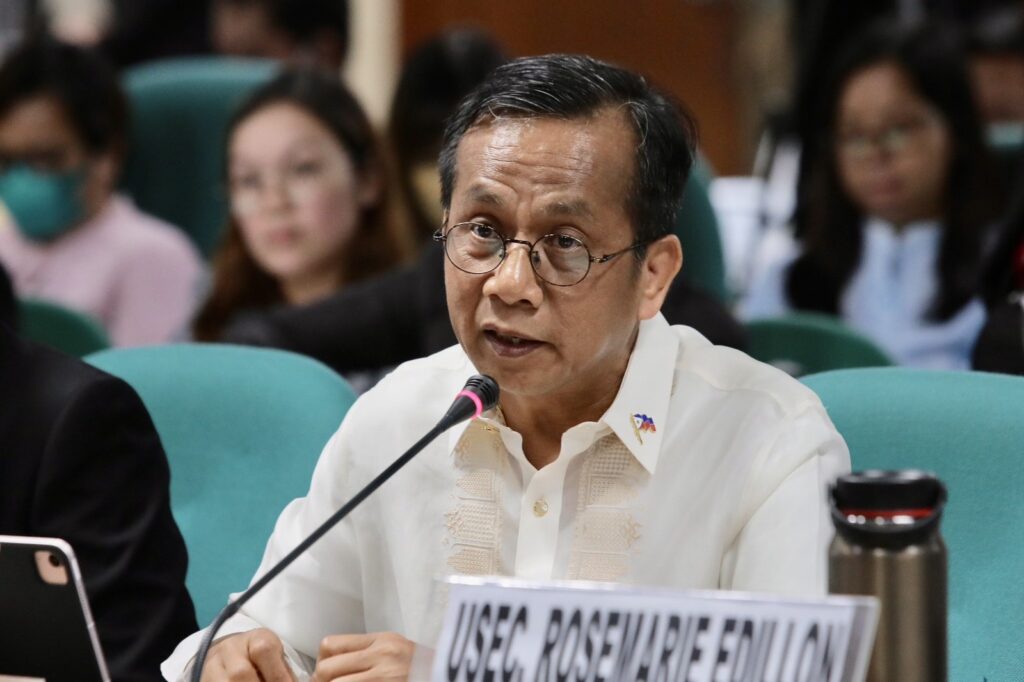NEDA: EO12 review in motion, covers the inclusion of 2-wheeled EVs

Socioeconomic Planning Sec. Arsenio Balisacan answers queries from senators in this file photo in September 2023. Senate PRIB file photo / Voltaire F. Domingo
MANILA — The National Economic and Development Authority has already initiated the process to revisit the provisions of Executive Order No. 12, series of 2023, which had excluded two-wheeled vehicles from the tax breaks.
“My office is coordinating with the Tariff Commission and the Department of Trade and Industry for the review of Executive Order No. 12. We can provide details on the review soon,” said NEDA’s chief Arsenio Balisacan.
“Yes, the review will include the inclusion of 2-wheeled vehicles,” answered Balisacan when asked if the issue on EO12 provision which had excluded e-motorbikes from the EV industry incentives will be part of the discussions.
The statement of the NEDA chief was in response to queries of EV industry stakeholders and environmentalists on the status of EO12’s mandatory review which should have started in February 21, 2024.
Executive Order No. 12 series of 2023 was enacted to complement the Electric Vehicle Industry Development Act (EVIDA) to create an industry for EVs in the country and help reduce carbon emissions, in compliance with the Philippines’ commitment to the Paris Agreement. It modifies the tariff rates for EVs to help mainstream its use among Filipinos.
Under the EO, EVs such as kick scooters, pocket motorcycles and self-balancing cycles are included in the tax breaks. Two-wheeled electric vehicles, on the other hand, are still subject to 30% import duty.
The EV industry stakeholders and clean air advocates alike have since been urging the government to review the executive issuance to include two-wheeled electric vehicles such as e-motorcycles.
According to the Statista Research Department, the power production in the Philippines is still dominated by coal at 47.6%, followed by other fossils at 18%, and gas at 10.7%, which totals 76.3%.
Various types of renewable energy generation like wind, solar, bioenergy, hydro and other renewables share at 23.7% of the country’s total power source.
The transportation sector, alone, in the country is responsible for emitting 31.54 million tons of carbon dioxide which contributes to climate change.
As stated by IQAir, the rate of PM2.5 pollutants in Manila is twice the World Health Organization (WHO) annual air quality guideline value
WHO stated that it is vital to achieve the right air quality guideline value to minimize the health risk from pollutant exposure.
Meanwhile, the Land Transportation Office has recorded almost 8 million units of motorcycles in their agency, it being shown that motorcycles are the most favored mode of transportation of motorists in the country.
Earlier, Albay 2nd District Rep. Joey Salceda has introduced House Bill No. 9573, seeking to amend the provisions of the EVIDA. The lawmaker from Bicol emphasized that 60% of electric vehicles in the country fall into the two-wheeled category, making their exclusion from tax incentives inequitable.
Among the key amendments outlined in the bill is the redefinition of electric vehicles, modifying Section 4, Chapter 1 of Republic Act No. 11697, to include two-wheeled vehicles in the definition of electric vehicles.
According to the Department of Trade and Industry, the Philippines aims to go full on electric vehicles by 2040 and is set to limit the sale of internal engine combustion cars as part of its comprehensive plan to transition to what environmentalists foresee as “green traffic,” or a decarbonized road network in the country.
Subscribe to INQUIRER PLUS to get access to The Philippine Daily Inquirer & other 70+ titles, share up to 5 gadgets, listen to the news, download as early as 4am & share articles on social media. Call 896 6000.







